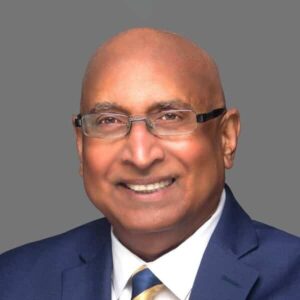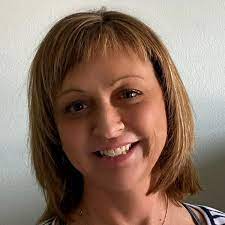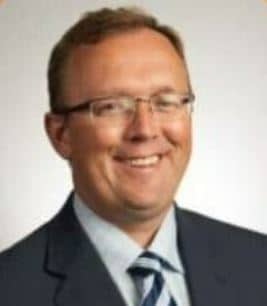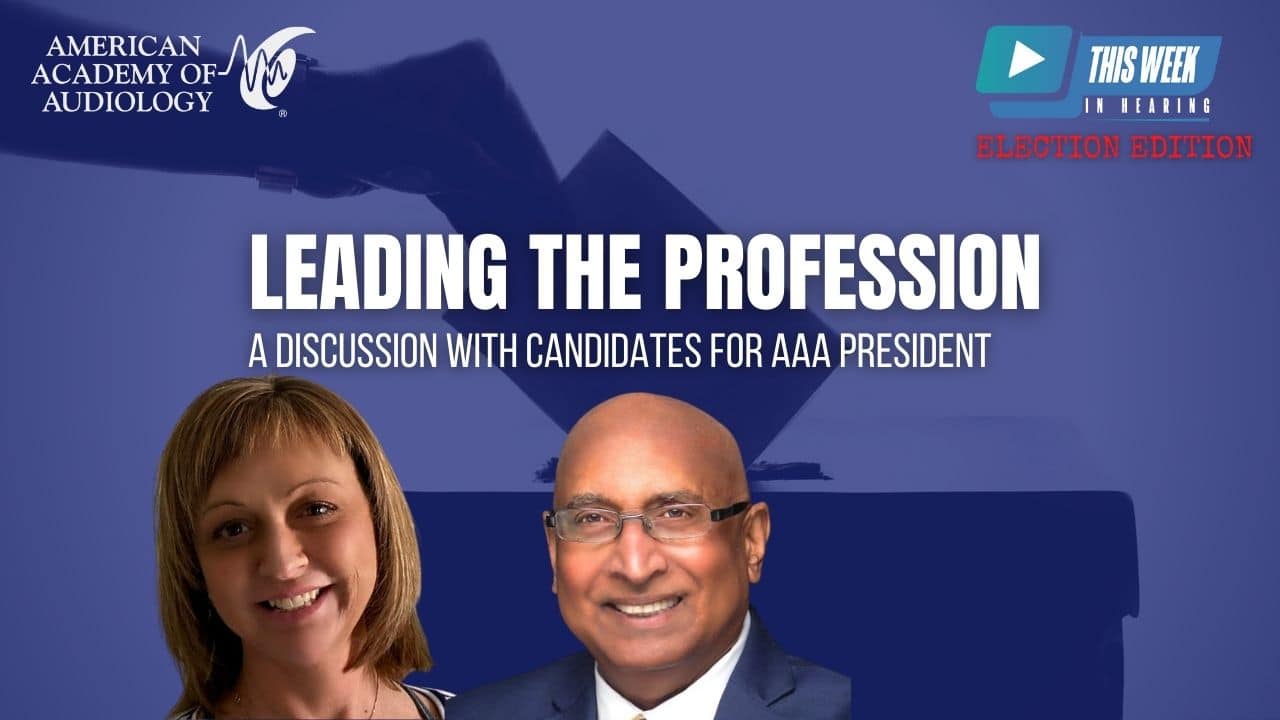If you are a member of the American Academy of Audiology, and you have yet to cast your vote for president-elect, this special episode of This Week in Hearing is well worth your time.
Both candidates, Bopanna Ballachanda and Rebekah Cunningham, sat down with TWIH to chat about their career paths and the vision they have for the profession.
Full Episode Transcript
Brian Taylor 0:09
Welcome, everybody to a special edition of This Week in Hearing. I think as many of you know, the American Academy of Audiology has their annual election for president. And I’m pleased today to have a special guest, Dr. Bopanna Ballachanda is with us today. And he’s gonna tell us a little bit about himself and his vision for the future of Audiology. Welcome, Dr. B.
Bopanna Ballachanda 0:36
Thank you, sir. Thank you, Dr. Taylor. So it was wonderful to see you at the convention and, and appreciate you taking time to have this conversation with me. And to give you a little description of what I have been doing, some of the things are visible, some are not, I have to go back to some of the beginnings of it. Because just to give you a little … please do, I came to this country in the 80s with one vision, the one thing was to get an education and excel in the field of audiology. Got my PhD from Callier Center. And then I was invited to be a faculty at Purdue University in the mid Midwest. That was a great start and a great breakthrough in the in the process of getting the training that I needed for the future. It’s a great school, and the rigor of teaching, research. And funding was pretty high. So I found a very challenging it, it was very appealing to me. So from there, I was on a trip to and I started the cerumen management workshop for audiologists in 1992. That gets got some notoriety for me. And one of the trips, one of the I mean, I visited many universities, and the state conventions, and one of the invitation was from New Mexico, but came here and I fell in love with the southwest. The precursor to that if I can say this, I used to watch a lot of Western movies in India, I felt like very much western world here. I said I want to go there. So there was an opening came here as an associate professor stayed here for seven years. And a couple of books chapters. And the entire interest at that time was to give it back to the society. So I got involved in the politics or the association work in before that I was involved with ASHA on multicultural issues, and represented couple of caucuses at that time the the association Indian caucus, and the Asian Pacific Islander caucus. So that helped me because New Mexico is has a diverse population. So it helped me understand the needs of multicultural population. And that helped me to put myself in, in political arena, and chaired few things and involved in the American Academy of Audiology committees. Finally, in 2006, I got elected to the board of directors. And it was a wonderful thing that happened at that time. After that I stayed at the University for seven years. And one day, I don’t know that was a urge to get into practice to get into clinical arena. And I resigned with the guaranteed job, which looking back was a different story. But at that time, I wasn’t sure what I did was right. And started my clinic in Santa Fe, New Mexico. And make it simple and come to the conclusion I ended up having 15 to 16 clinics in Arizona, New Mexico and Dallas Fort Worth. So I had 60 employees. It was a good run and employed so many audiologists. It was an eye opener to see what the clinical aspect was. So I had to manage personnel budget and being in private practice it is a challenge. So at this time, I feel that I’m at a stage in my life, where I have the time And the energy and, and hopefully a lot of experience behind me to lead a great organization and take it to the next level.
Brian Taylor 5:09
Yeah, well, you and I talk about a diverse experience, Professor, practice owner, not just a practice one practice, but several practices spread across three states is a huge, huge challenge. So you have a range of experiences to draw upon. And, you know, based on that, I’m curious to know, your take on some of the challenges that the profession faces.
Bopanna Ballachanda 5:38
There are many challenges I will allude to few of them, which are currently in the minds of most of the audiologist. The number one is the OTC I mean, we are trying to find a simple solution to a complex problem like hearing loss, I wish we had a simple solution. An example I can give you a is when you do a tympanogram immittance testing, you have to make sure the ear is plugged. And we try a couple of times to get the right fit. As a professional, we struggle to find the right fit to get the seal. So if that’s the case, then I am a little concerned, and wonder how a public will have that efficiency. And it just meant so that’s the simplest way to explain, but the hearing is a complex process. So it has to be addressed complex – a gadget is a means but not the end of it. The second area is which I, got close to my heart, is the area of telepractice. Because we are seeing a considerable shortage of audiologists, the number of audiolologists entering into the field is minimized by the people who are going out of the for various reasons. And it has not changed. And I was talking to Victor Bray, and I’m learning about the workforce changes that has happened. And they had one of the most they explain that the growth is less than 10%. I think which probably you know that too. You might have seen that publication. So we are at a crossroads of a large population entering into the hearing care, and a small population in clinical audiology. So how do we balance this? We need to get very innovative, you know, we have to try certain things. Sometimes we make mistakes. Sometimes we get ambitious and reaching out in theory, as I said, by trying to find a simple solution to a complex problem. So that’s one area that I will be, I’ll be trying to find a healthy, happy medium for both audiologist and the public to help them because at the end of the day, it’s our patient who comes first of all, other one that I have been talking because from the day I entered Purdue University, the four of us Carl Penny David Goldstein, and Jean Boggess and myself, were involved in writing the syllabus for the AuD. So the intent was to have a strong education. But we have gone through iterations of that in many ways. So I would be involved, I’d be very much interested in how to make this process a lot more cleaner and educate our students and bring out the best audiologist. These are some of the things that that’s in the end, then there is always payment because we need to get paid. That’s another issue. So and then there are many things which I don’t want to take too much time I think every practitioner feels the pinch of the middle people who are trying to squeeze them. So we have to work in as collectively as a group as not as an individual. So that’s my focus, to bring a better life to the audiologist and give them an empowerment that we are practitioners. There’s another process that’s going through and we’ll do we’ll make available funds and support for that. What the ADA and ASHA’s collaboration, cooperation.
Brian Taylor 9:30
Well there’s a lot of
a lot of things happening now and it’s good to see your list of priorities. It’s good and one one final question for you Dr. B. And that is I guess look, you know, with a crystal ball looking into the future, what’s your vision for AAA and your role as presidents How do you see yourself shaping the future of AAA?
Bopanna Ballachanda 9:52
Yeah, I have to be candid as well as open with you. The association was formed by, for audiologists. So we want to get more members involved in this process. And as well as the focus has to be our audiologists. And anything that audiology has to achieve has to be done through AAA. And that’s the one thing that I will be looking at is the only thing that I’m interested in all these are issues, but audiologists come first, there are issues that we have to address. And I mean, they can, I can go on to a member satisfaction, member participation, and member involvement. And member cooperation, we need a large pool of audiologists working towards a cause of either getting MAASA are getting teleaudiology, better payment plans. So we all have to work together as a group. And that’s what I envision as a leader. And that would be I mean, we have heard that we are working on few things. But we would like to put a closure and find an answer. I have answered your
Brian Taylor 11:20
question. You have answered my questions very well, thank you. Any final words that you want to share with our audience before we sign off?
Bopanna Ballachanda 11:29
The thing is I can’t say just vote for me. That’s the easy way out. But look at all the participants are the members were in that board of directors panel. And I’ll be more than happy to involve myself and extend myself to serve the community that I belong. And I love.
Brian Taylor 11:54
It’s a great way to end the conversation here. So thank you, Bopanna Balachandra, finally, and affectionately known, at least by me as Dr. B. It’s great to have you, I know that in my library behind me, I have a copy of the second edition of your human ear canal book. And I was lucky enough to be a contributing author in a chapter of that book. So it’s so good to have you on our broadcast. Thank you for taking the time.
Bopanna Ballachanda 12:27
Thank you. And thank you for inviting me to write a chapter in your book.
Brian Taylor 12:39
Hi, everyone, and welcome to another edition of This Week in hearing. I’m Brian Taylor. And we have a very special episode again, today, we’re going to be interviewing another AAA candidate for president. And today we have with us Dr. Rebekah Cunningham. Dr. Cunningham, welcome to This Week in hearing. It’s great to have you with us.
Rebekah Cunningham 13:00
Thank you so much. It’s great to be here.
Brian Taylor 13:03
So I think we’ll just kind of start with asking you. Tell us a little bit about your background.
Rebekah Cunningham 13:09
Sure. Most of my background is in pediatric audiology. I did and have, of course, worked with adults and hearing aid dispensing on that level. I’ve worked in neurotology offices. I worked for Phonak. And I have been a professor since let’s just say a long time. Okay, fair enough. Yeah, I’m still an adjunct. At A.T. Still. okay. I still teach for them.
Brian Taylor 13:43
So a very diverse background. Tell us a little bit about your current role?
Rebekah Cunningham 13:47
Sure. Well, no surprise. I’m an educational audiologist. I work for the state of Indiana. And we are unique in that our Department of Health has an entire division called the Center for Deaf and Hard of Hearing Education. And for all of those very rural and very small school corporations who might have children who are deaf and hard of hearing. They contract with us. Some of the bigger ones like Indianapolis, public schools, they they don’t need or if they have their own educational audiologist. But some of these more rural places in charter schools do need us. So there are actually seven of us. And I have about 25 kids on my caseload, and I love the little ones.
Brian Taylor 14:31
That’s interesting. And I’ve seen your name and a few publications over the over the years. I know that you’re quite active in pediatric audiology, as you said. What I wanted to talk about next was the, your candidacy for AAA president. Maybe tell us from your perspective, some of the some of the challenges that the profession of audiology faces over the short term.
Rebekah Cunningham 14:55
Yeah, well, short term and long term is always going to be reimbursement. We have not what we need, to put it that way. Okay. Yeah, um, I would like to see best practices, best clinical practices be promoted a little bit more and adopted out there. I think that we need more public and other professional awareness of who we are and what we do.
Brian Taylor 15:27
Well, maybe tell us a little bit if you could elaborate on maybe how you envision your role moving those moving those challenges along?
Rebekah Cunningham 15:38
Yeah, they’re kind of big. Yeah.
Brian Taylor 15:41
No doubt about it. So how do you see yourself fitting into moving those moving those along?
Rebekah Cunningham 15:46
I guess one of the things that matters most to me about audiology. And what kind of really prompted me to go ahead and do this is, I feel like that leadership everywhere, needs to listen to the membership more. So I envisioned things like focus groups, meeting at state meetings with other professionals, discussing the things that they think is important. And I think that these topics will come up. But I want to kind of get down to a grassroots level. And I want to pay attention to what is being said, because I see it, and I hear it all the time. And I don’t know that everything that is important to us as a membership is being addressed the way that we want it to be. So I really want to I want to take that initiative, whether that’s, you know, clinical best practices, whether it’s reimbursement, and I already think there’s a huge group out there already working on some of these not this is not new stuff. I just want to I just want to help it along. By listening to them.
Brian Taylor 17:00
Exactly. It helps to have a fresh perspective. It can sometimes further the process quite a bit. That’s good to know what you said. So my next question for you, Rebekah would be tell us what advice you would give audiologists out in the field and how they can better collaborate with AAA, and with the leadership,
Rebekah Cunningham 17:21
I would encourage people to, to one become a member of this organization, and to out to your colleagues reach out to the people who are leaders, and express your concerns in that way. What I see. And what I hear is a lot of people who are disgruntled or unhappy in some aspect or the other, but they’re only talking to one another. And what I would like to do, and that’s where I come up with the ideas of focus groups and, you know, grassroots things where I can get in there, and I can I can be the ears, so to speak, of what the membership really wants. So I would encourage them to become a member, I think it’s only through, you know, being active that you can invoke the change.
Brian Taylor 18:15
Sounds good. My last question for you would be around maybe looking more longer term. What’s your vision for AAA? What’s your vision for audiologists if you had a crystal ball and you looked over the next decade or so? What would you like to see unfold for the profession?
Rebekah Cunningham 18:35
I think that we would have more respect in the eyes of our colleague peers, more respect for the education and the knowledge that we bring in helping with hearing health, more respect for one another, more respect for our organizations, and there’s more than one. And that not only do we have that respect, but it’s shown in ways like appropriate reimbursement, and appropriate public knowledge of who we are and what we do. So those are kind of really big, lofty goals. And I understand that and and I by no means think that I can accomplish those in three years, but they’re definitely worth working towards.
Brian Taylor 19:28
Yeah, no, that’s sounds good. I think the members of AAA would or would be really happy to hear that. Good. Any final thoughts to share with our viewers at This Week in Hearing about yourself about your presidential candidacy. Anything at all that you would like the viewers to know.
Rebekah Cunningham 19:45
I think you’ll be in good hands regardless of who the winner is. But, yeah. I’m honored to be doing this. So I want to thank you very much for for doing this.
Brian Taylor 19:56
Yeah, it’s great to have you on the on the broadcast. Rebekah, we really appreciate you time. So, Rebeka Cunningham audiologist, PhD audiologist for the Indiana public health. How would you say your what’s your what’s your exact title?
Rebekah Cunningham 20:13
It’s educational audiologist with the Indiana Department of Health
Brian Taylor 20:18
with the Indiana Department of Public Health. That’s a pretty unique role, though. Thank you. Thank you for being on the broadcast. Really appreciate your time.
Rebekah Cunningham 20:25
Thank you
Be sure to subscribe to the TWIH YouTube channel for the latest episodes each week and follow This Week in Hearing on LinkedIn and Twitter.
Prefer to listen on the go? Tune into the TWIH Podcast on your favorite podcast streaming service, including Apple, Spotify, Google and more.
About the Panel
 Bopanna Ballachanda, PhD, has held faculty position at Purdue University and the University of New Mexico and currently he teaches at Texas Tech University Health Sciences and had served twice as a member of the board of directors of the American Academy of Audiology. He incorporated tele-audiology practice to efficiently manage multiple clinics he owned in the South west part of United States.
Bopanna Ballachanda, PhD, has held faculty position at Purdue University and the University of New Mexico and currently he teaches at Texas Tech University Health Sciences and had served twice as a member of the board of directors of the American Academy of Audiology. He incorporated tele-audiology practice to efficiently manage multiple clinics he owned in the South west part of United States.
 Rebekah F. Cunningham, PhD, has more than 20 years of experience in teaching and mentoring audiology students and providing audiology services to children and adults. She currently is an adjunct associate professor at A.T. Still University. Rebekah is also an associate editor of Audiology Today and the American Academy of Audiology’s website.
Rebekah F. Cunningham, PhD, has more than 20 years of experience in teaching and mentoring audiology students and providing audiology services to children and adults. She currently is an adjunct associate professor at A.T. Still University. Rebekah is also an associate editor of Audiology Today and the American Academy of Audiology’s website.
 Brian Taylor, AuD, is the senior director of audiology for Signia. He is also the editor of Audiology Practices, a quarterly journal of the Academy of Doctors of Audiology, editor-at-large for Hearing Health and Technology Matters and adjunct instructor at the University of Wisconsin.
Brian Taylor, AuD, is the senior director of audiology for Signia. He is also the editor of Audiology Practices, a quarterly journal of the Academy of Doctors of Audiology, editor-at-large for Hearing Health and Technology Matters and adjunct instructor at the University of Wisconsin.






